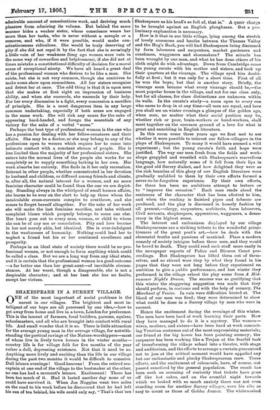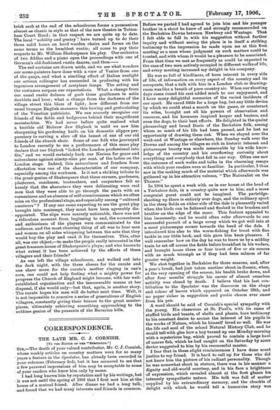SHAKESPEARE IN A SURREY VILLAGE.
ONE of the most important of social problems is the unrest in our villages. The brightest and most in- telligent of our boys are all possessed by one idea,—how to get away from home and live in a town, London for preference. This is the lament of farmers, local builders, parsons, squires, schoolmasters, and all who are brought into contact with rural life. And small wonder that it is so. There is little attraction for the average young man in the average village, for notwith- standing the poetical ravings of the Nature-worshippers—most 9f whom live in lively town houses in the winter months— country life is for village folk for five months of the year rather a dull, depressing existence. Not that it need be so. Anything more lively and exciting than the life in our village during the past two months it would be difficult to conceive. Dull leisure evenings ! Good heavens ! Front the retired sea- captain at one end of the village to the bootmaker at the other, no one has had a moment's leisure. Excitement! There has leen too much of it. Had it lasted another day none of us could have survived it When Joe Noggins went two miles on the road to his work before he discovered that he had left his can of tea behind, his wife could only say, "That's that 'ere Shakespeare as his head's so full of, that is." A queer chile to be brought against an English ploughman. But a pre- liminary-explanation is necessary.
How is it that in our little village, lying among the stretch of lovely commons and heaths between the Thames Valley and the Hog's Back, you will find Shakespeare being discussed by farm labourers and carpenters, market gardeners and coachmen, waggoners and shoemakers ? The miracle has been wrought by one man, and what he has done others of his cloth might do with advantage. Down from Cambridge came the young curate with his mother and sisters, and took lip their quarters at the vicarage. The village eyed him doubt- fully at first ; but it was only for a short time. First of all he won the boys; but that is another story. Briefly, the vicarage soon became what every vicarage should be,—the most popular house in the village, and not for one class only, but for all classes, for class distinctions are unknown within its walls. In the curate's study—a room open to every one who cares to drop in at any time—all men are equal, and here you shall see on winter evenings a glimpse of the golden age, when men, no matter what their social position may be, whether rieh or poor, brain-workers or band-workers, shall meet together on the common ground of a love for what is great and ennobling in English literature.
In this room some three years ago we first met to see whether it were possible to interest our fellow-villagers in the plays of Shakespeare. To many it would have seemed a wild experiment ; but the young curate's faith and hope were justified. The way our men fresh from the fields and work- shops grappled and wrestled with Shakespeare's marvellous language, how naturally some of it fell from their lips in the good old Surrey dialect, and how delighted they were as the rich beauties of this glory of our English literature were
gradually unfolded to them by their own efforts formed a never-to-be-forgotten experience. By their own efforts,
for there has been no ambitious attempt to lecture -or to "improve the occasion." Each man reads aloud the sentences of the character that has been allotted to him, and when the reading is finished pipes and tobacco are produced, and the play is discussed in homely fashion by all present,—clergy, carpenters, architects, farm labourers, Civil servants, shopkeepers, apprentices, waggoners, a demo. cracy in the highest sense.
The interest and enthusiasm displayed by our village Shakespeareans are a striking tribute to the wonderful primi- tiveness of the great poet's art,—how he deals with the elemental truths and passions of mankind. Place a modern comedy of society intrigue before these men, and they would be bored to death. They could read such stuff more easily in the newspaper reports of Police and Divorce Court pro- ceedings. But Shakespeare has lifted them out of them- selves, and so stirred were they by what they found in his pages that they were not long before they experienced an ambition to give a public performance, and last winter they performed in the village school the play scene from A Mid- summer Night's Dream. The success was so gratifying that this winter the staggering suggestion was made that their should perform, in costume and with the help of scenery, The Merchant of Venice. In vain were difficulties hinted at. The blood of our men was fired; they were determined to show what could be done in a Surrey village by men who were in earnest.
Hence the excitement during the evenings of this winter. The men have been bard at work learning their parts. How
they have managed to do it is a mystery. The women—
wives, mothers, and sisters—have been hard at work concoct- ing Venetian costumes out of the most unpromising materials; our friend at the big house has been painting scenery ; the
carpenter has been working like a Trojan at the fearful task of transforming the village school into a theatre, with stage
and auditorium, and the efforts to arrange a curtain guaranteed not to jam at the critical moment would have appalled any but our enthusiastic and plucky Shakespearean crew. These efforts, and the excitement of rehearsals, have, of course, not passed unnoticed by the general population. The result has been such an arousing of curiosity that tickets have gone off like hot cakes, and on the eventful night towards which we looked with so much anxiety there was not even standing room for another Surrey villager, were his ribs as easy to count as those of Gobbo Junior. The whitewashed
brick arch at the end of the schoolroom forms a proscenium almost as classic in style as that of the new theatre in Totten- ham Court Road ; in that respect we are quite up to date. The local "nobility and gentry have turned up to do their three solid hours on hard wooden chairs and forms on the same terms as the humblest rustic; all come to pay their respects to Mr. William Shakespeare his play. Our orchestra of two fiddles and a piano open the proceedings with one of German's old-fashioned rustic dances, and then—
The red curtains are drawn aside, and we see what wonders our scene-painters have done with a view of Venice from one of the quays, and what a startling effect of Italian sunlight our artisan colleague has succeeded in producing with his ingenious arrangement of acetylene lamps. The acting and the costumes surpass our expectations. What a change from our usual rustic dulness of garb these gentlemen in satin doublets and hose; what a change from the darkness of the . village street this blaze of light; how different from our usual brusque English manners this bowing and gesticulating . of the Venetian patriciate. We can scarcely recognise our friends of the fields and hedgerows behind their magnificent moustachios. We had never before quite realised what a terrible old Hebrew Jew Sbylock is until we saw him sharpening his gardening knife on his domestic slipper pre- paratory to carving a slice off the breast of one of our old • friends of the church choir. Some of our folk who journeyed to London recently to see a performance of this same play declare that our Shylock "licked the London professional into • fits," and we would certainly back our Nerissa for grace and - naturalness against ninety-nine per cent. of the ladies on the London stage. Indeed, this naturalness and freedom from affectation was one of the characteristics of our company, especially among the workmen. Is it not a striking tribute to the great' genius of Shakespeare that these carmen, gardeners, . plasterers, coachmen, bootruakers, and carpenters felt so - keenly that the characters they were delineating were real men that they were able to go through the parts with an earnestness and an absence of self-consciousness which we often miss on the professional stage, and especially among "cultured amateurs " ? If any one came expecting to see the great play . brought into contempt, they must have been agreeably dis- appointed.The slips were scarcely noticeable, there was not a ridiculous moment from beginning to end, the earnestness and enthusiasm of the players were communicated to the audience, and the most cheering thing of all was to hear men and women on all sides whispering between the acts that they would buy the play and read it for themselves. This, after all, was our object,—to make the people really interested in the great treasure-house of Shakespeare's plays ; and who knows to • what extent it has been achieved by the efforts of these
• villagers and their .friends?
• As one left the village schoolroom, and walked out into the dark night, with the three cheers for the curate and one cheer more for the curate's mother ringing in one's • ears, one could not help feeling what a mighty power for progress the Church of England might become, with her well- established organisation and the innumerable means at her • disposal, if she would only—but that, again, is another story. The curate hopes his men will do better next time. Well, it • is not impossible to conceive a series of generations of English villagers, constantly giving their leisure to the great master- pieces, ultimately achieving something approaching to the . sublime genius of the peasants of the Bavarian hills.











































 Previous page
Previous page